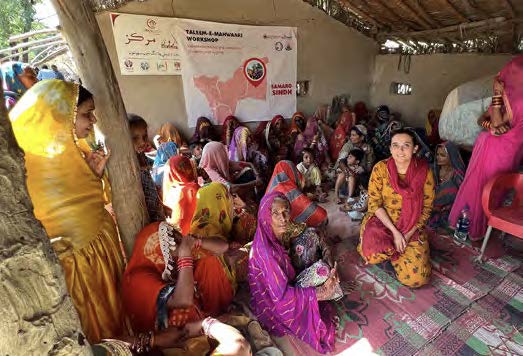Baithak CSO and DASTAK Foundation, in their collaborative efforts to respond to the disastrous droughts and floods in Pakistan with a gender-just and an intersectional approach, developed a strategic framework tool for policymakers and practitioners. It offers actionable recommendations for gender-equitable response measures that meet the specific needs of women and girls during climate disasters and prioritize their health, well-being, and safety. This feminist policy resource builds on extensive stakeholder engagement, including social media listening targeting 30,000 menstruating individuals, direct consultations with 5,000 women and girls affected by floods, and collaboration with 40 grassroots organizations.
| Climate impact |
 |
Nation-wide mapping and ground research on climate emergency impacts on women and girls existing response measures. |
 |
Native seedling growing and propagation restores
degraded ecosystems. |
|
|
| Gender impact |
 |
Awareness raising on the gender differentiated impacts of climate disasters i.e. exacerbated gender based violence and additional unpaid care work. |
 |
Intersectional approach to ensure gender equitable diaster response: menstrual products, WASH facilities, pregnancy kit, pre-and postnatal care services. |
 |
Inclusion of women in policy processes and grassroots initiatives. |
| Scalability/replicability |
 |
The framework is an open sources document where insights and expert opinions are crowd sourced. |
 |
Government, INGOs, NGOs, and grassroots organizations are invited to integrate recommendations into their existing climate crisis response programs and actions. |
 |
Partnership with 40 local organizations to develop the framework tool. |





